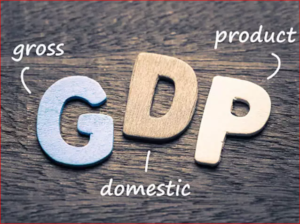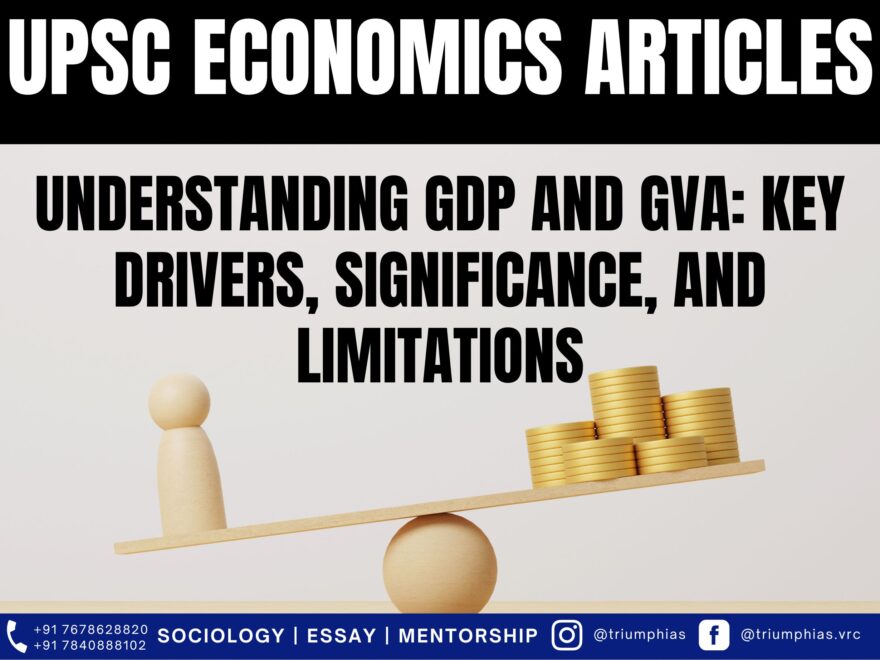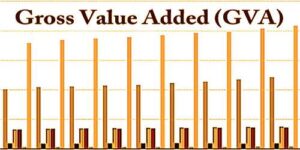GDP and GVA
(Relevant for Economics Section of General Studies Paper Prelims/Mains)

GDP and GVA
The Gross Domestic Product (GDP) quantifies the monetary value of all “final” goods and services—those acquired by the ultimate consumers—manufactured within a nation during a specified time frame.
There are four pivotal drivers of GDP growth:
- Private Final Consumption Expenditure (PFCE): This encompasses all personal expenses made by Indians.
- Government Final Consumption Expenditure (GFCE): This includes all government spending on its operational needs, like salaries.
- Gross Fixed Capital Expenditure: This encapsulates investments made to enhance the economy’s productive potential, involving business firms setting up factories and government initiatives to develop infrastructure.
- Net Exports (NX): This represents the combined impact of exports (foreign spending on domestic products) and imports (Indian expenditure on foreign goods).
GDP = private consumption + gross investment + government investment + government spending + (exports-imports)
GVA
- The Gross Value Added (GVA) computes the equivalent national income from the perspective of the supply side. It accomplishes this by aggregating the value added across diverse sectors.
- As per the Reserve Bank of India (RBI), the GVA of a sector is determined as the output value minus the value of its intermediary inputs. This surplus “value added” is distributed among the principal factors of production: labor and capital.
- By analyzing the growth of GVA, one can gain insights into the resilience of different economic sectors, distinguishing between those performing strongly and those encountering challenges.
How are the two Related
- The GDP is computed by examining the GVA figures. The relationship between GDP and GVA can be expressed through this equation: GDP = (GVA) + (Government taxes collected) — (Government subsidies granted). Consequently, if the government’s tax revenue surpasses the subsidies it extends, the GDP will exceed the GVA.
- GDP data becomes more valuable when assessing yearly economic expansion or when aiming to contrast a country’s current economic growth with its past growth or with another nation’s.
Significance of GDP
- GDP holds significant importance as it offers insights into the scale and effectiveness of an economy. The pace of growth in real GDP is often utilized to signify the overall well-being of the economy.
- An upsurge in real GDP is generally interpreted as a positive sign of a thriving economy. Rapid growth in real GDP typically translates to increased employment opportunities, as businesses tend to hire more workers for their operations, leading to greater disposable income for individuals.
- During episodes of GDP decline, as observed in numerous nations during recent global economic turmoil, employment levels usually decrease. There are scenarios where GDP might be expanding, but not at a pace sufficient to generate an ample number of job opportunities for those seeking employment. It’s worth noting that real GDP growth tends to occur in cyclical patterns over time.
- GDP per capita is a common metric employed to gauge a nation’s standard of living. A higher GDP per capita generally indicates improved accessibility to goods and services, thereby enhancing the quality of life for a country’s citizens.
- Governments also utilize GDP data to guide policy decisions. For instance, when GDP growth decelerates, a government might implement stimulus measures like tax reductions or increased government spending to rejuvenate the economy.
- GDP serves as a widely accepted benchmark for evaluating the economic performance of different countries. This facilitates governments and investors in determining where to allocate investments and how to allocate resources effectively.
Limitations of GDP
- GDP does not cover the entirety of productive activities. Uncompensated efforts like household chores or voluntary services, as well as clandestine market transactions, are excluded from the calculation due to their intricate valuation challenges. For instance, a baker who crafts a loaf of bread for a customer contributes to GDP, but the same activity performed for his family does not contribute to GDP (although the ingredients purchased are still counted).
- The term “gross” in Gross Domestic Product does not factor in the deterioration of machinery, buildings, and other assets necessary for production (referred to as capital stock). Subtracting the depreciation of these capital goods from GDP yields the net domestic product (NDP).
To master these intricacies and fare well in the Sociology Optional Syllabus, aspiring sociologists might benefit from guidance by the Best Sociology Optional Teacher and participation in the Best Sociology Optional Coaching. These avenues provide comprehensive assistance, ensuring a solid understanding of sociology’s diverse methodologies and techniques.
GDP, GVA, GDP and GVA, Gross Domestic Product, Gross Value Added, economic indicators, economic growth, GDP formula, GDP significance, GDP limitations, GVA calculation, RBI, Net Exports, PFCE, GFCE, policy decisions, government spending, economic performance, real GDP, GDP per capita, Best Sociology Optional Coaching, Sociology Optional Syllabus.

Choose The Best Sociology Optional Teacher for IAS Preparation?
At the beginning of the journey for Civil Services Examination preparation, many students face a pivotal decision – selecting their optional subject. Questions such as “which optional subject is the best?” and “which optional subject is the most scoring?” frequently come to mind. Choosing the right optional subject, like choosing the best sociology optional teacher, is a subjective yet vital step that requires a thoughtful decision based on facts. A misstep in this crucial decision can indeed prove disastrous.
Ever since the exam pattern was revamped in 2013, the UPSC has eliminated the need for a second optional subject. Now, candidates have to choose only one optional subject for the UPSC Mains, which has two papers of 250 marks each. One of the compelling choices for many has been the sociology optional. However, it’s strongly advised to decide on your optional subject for mains well ahead of time to get sufficient time to complete the syllabus. After all, most students score similarly in General Studies Papers; it’s the score in the optional subject & essay that contributes significantly to the final selection.
“A sound strategy does not rely solely on the popular
Opinion of toppers or famous YouTubers cum teachers.”
It requires understanding one’s ability, interest, and the relevance of the subject, not just for the exam but also for life in general. Hence, when selecting the best sociology teacher, one must consider the usefulness of sociology optional coaching in General Studies, Essay, and Personality Test.
The choice of the optional subject should be based on objective criteria, such as the nature, scope, and size of the syllabus, uniformity and stability in the question pattern, relevance of the syllabic content in daily life in society, and the availability of study material and guidance. For example, choosing the best sociology optional coaching can ensure access to top-quality study materials and experienced teachers. Always remember, the approach of the UPSC optional subject differs from your academic studies of subjects. Therefore, before settling for sociology optional, you need to analyze the syllabus, previous years’ pattern, subject requirements (be it ideal, visionary, numerical, conceptual theoretical), and your comfort level with the subject.
This decision marks a critical point in your UPSC – CSE journey, potentially determining your success in a career in IAS/Civil Services. Therefore, it’s crucial to choose wisely, whether it’s the optional subject or the best sociology optional teacher. Always base your decision on accurate facts, and never let your emotional biases guide your choices. After all, the search for the best sociology optional coaching is about finding the perfect fit for your unique academic needs and aspirations.
To master these intricacies and fare well in the Sociology Optional Syllabus, aspiring sociologists might benefit from guidance by the Best Sociology Optional Teacher and participation in the Best Sociology Optional Coaching. These avenues provide comprehensive assistance, ensuring a solid understanding of sociology’s diverse methodologies and techniques. Sociology, Social theory, Best Sociology Optional Teacher, Best Sociology Optional Coaching, Sociology Optional Syllabus.
Best Sociology Optional Teacher, Sociology Syllabus, Sociology Optional, Sociology Optional Coaching, Best Sociology Optional Coaching, Best Sociology Teacher, Sociology Course, Sociology Teacher, Sociology Foundation, Sociology Foundation Course, Sociology Optional UPSC, Sociology for IAS,
Follow us :


https://t.me/VikashRanjanSociology
Find More Blogs
|
Scope of the subject and comparison with other social sciences |
|||
|
|
|
|
Modernity and social changes in Europe |



One comment